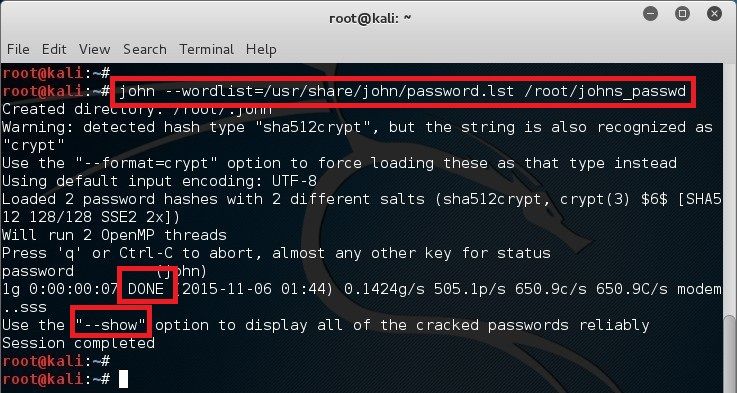Cara Instal John The Ripper Untuk Windows 7
Its primary purpose is to detect weak Unix passwords. Besides several crypt(3) password hash types most commonly found on various Unix systems, supported out of the box are Windows LM hashes, plus lots of other hashes and ciphers in the community-enhanced version.John the Ripper is free and Open Source software, distributed primarily in source code form. If you would rather use a commercial product tailored for your specific operating system, please consider John the Ripper Pro, which is distributed primarily in the form of 'native' packages for the target operating systems and in general is meant to be easier to install and use while delivering optimal performance.What's New:We've just released John the Ripper 1.9.0-jumbo-1, available from the usual place, here.Only the source code tarball (and indeed repository link) is published right now.
I expect to add some binary builds later (perhaps Win64).It's been 4.5 years and 6000+ jumbo tree commits (not counting JtR core tree commits, nor merge commits) since we released 1.8.0-jumbo-1:this time, we recommended most users to use bleeding-jumbo, our development tree, which worked reasonably well - yet we also see valuein making occasional releases. So here goes.Top contributors who made 10+ commits each since 1.8.0-jumbo-1:.
magnum (2623). JimF (1545). Dhiru Kholia (532).

Claudio Andre (318). Sayantan Datta (266). Frank Dittrich (248). Zhang Lei (108).
John The Ripper Tutorial
Kai Zhao (84). Solar (75). Apingis (58). Fist0urs (30).
Elena Ago (15). Aleksey Cherepanov (10)About 70 others have also directly contributed (with 1 to 6 commits each), see doc/CREDITS-jumbo and doc/CHANGES-jumbo (auto-generated from git).
Many others have contributed indirectly (not through git).Indeed, the number of commits doesn't accurately reflect the value of contributions, but the overall picture is clear. In fact, we have the exact same top 6 contributors (by commit count) that we did for the 1.7.9-jumbo-8 to 1.8.0-jumbo-1 period years ago. That's some stability in our developer community.
And we also have many new and occasional contributors. That's quite some community life around the project.Unlike for 1.8.0-jumbo-1, which we just released as-is without a detailed list of changes (unfortunately!), this time we went for the trouble to compile a fairly detailed list - albeit not going for per-format change detail, with few exceptions, as that would have taken forever to write (and for you to read!) This took us (mostly magnum and me, with substantial help from Claudio) a few days to compile, so we hope some of you find this useful. Included below is 1.9.0-jumbo-1/doc/NEWS, verbatim.Major changes from 1.8.0-jumbo-1 (December 2014) to 1.9.0-jumbo-1 (May 2019):. Updated to 1.9.0 core, which brought the following relevant major changes:.
Optimizations for faster handling of large password hash files (such as with tens or hundreds million hashes), including loading, cracking, and '-show'. These include avoidance of unnecessary parsing (some of which creeped into the loader in prior jumbo versions), use of larger hash tables, optional use of SSE prefetch instructions on groups of many hash table lookups instead of doing the lookups one by one, and data layout changes to improve locality of reference. Solar; 2015-2017. Benchmark using all-different candidate passwords of length 7 by default (except for a few formats where the length is different - e.g., WPA's is 8 as that's the shortest valid), which resembles actual cracking and hashcat benchmarks closer. Solar, magnum; 2019.
Bitslice DES implementation supporting more SIMD instruction sets than before (in addition to our prior support of MMX through AVX and XOP on x86(-64), NEON on 32-bit ARM, and AltiVec on POWER):. On x86(-64): AVX2, AVX-512 (including for second generation Xeon Phi), and MIC (for first generation Xeon Phi). On Aarch64: Advanced SIMD (ASIMD). Solar, magnum; 2015-2019. Bitslice DES S-box expressions using AVX-512's 'ternary logic' (actually, 3-input LUT) instructions (the mm512ternarylogicepi32 intrinsic). DeepLearningJohnDoe, Roman Rusakov, Solar; 2015, 2019 (In jumbo, we now also use those expressions in OpenCL on NVIDIA Maxwell and above - in fact, that was their initial target, for which they were implemented in both JtR jumbo and hashcat earlier than the reuse of these expressions on AVX-512.).


How-to - Cracking ZIP and RAR protected files with John the RipperUpdated: 2014-07-313 minute readAfter seeing how to now we can use it for some tasks that may be useful to digital forensic investigators: getting around passwords. Today we will focus on cracking passwords for ZIP and RAR archive files.
Luckily, the JtR community has done most of the hard work for us. For this to work you need to have built the community version of John the Ripper since it has extra utilities for ZIP and RAR files. For this exercise I have created password protected RAR and ZIP files, that each contain two files.test.rar: RAR archive data, v1d, os: Unixtest.zip: Zip archive data, at least v1.0 to extractThe password for the rar file is 'test1234' and the password for the zip file is 'test4321'.In the 'run' folder of John the Ripper community version (I am using John-1.7.9-jumbo-7), there are two programs called 'zip2john' and 'rar2john'.
Run them against their respective file types to extract the password hashes./zip2john./test.zip./zip.hashes./rar2john./test.rar./rar.hashesThis will give you files that contain the password hashes to be cracked. Something like this./test.zip:$pkzip$2.2.1.0.0.1b.a80c.95e4e9547dcfcde4b8b2f05a80aaeb9d15dd76e7526b81803c8bf7.2.0.1b.f.72051312.0.44.0.1b.a808.cbafdd390bf49ea54064ab3ff9f486e6260b9854e37d1ee3a41c54.$/pkzip$After, that you can run John the Ripper directly on the password hash files./john./zip.hashesYou should get a message like: Loaded 1 password hash (PKZIP 32/64). By using John with no options it will use its default order of cracking modes. See the for more information on modes.Notice, in this case we are not using explicit dictionaries.
You could potentially speed the cracking process up if you have an idea what the password may be. If you look at your processor usage, if only one is maxed out, then you did not enable OpenMP when building.
If you have a multi-processor system, it will greatly speed up the cracking process.Now sit back and wait for the cracking to finish.
